|
kw0134 posted:Take as much time you need and if it's not the project you want to do, CK/EU is a good run and plenty of entertainment as it is. 
|
|
|
|

|
| # ? Apr 16, 2024 20:08 |
|
https://store.steampowered.com/app/529340/Victoria_3/ We have a formal release date for Vicky 3: and I hope to resume modding work soon after. Well, ideally if I don't get lost in the weeds playing this for a few months.
|
|
|
|
Kangxi posted:https://store.steampowered.com/app/529340/Victoria_3/ Time to wait for 2-4 expansions for it to become playable 
|
|
|
|
Kangxi posted:https://store.steampowered.com/app/529340/Victoria_3/ Extremely exciting!
|
|
|
|
A Visual History of Carantania - Part 1 "Kocelj-Ri in Bohemia" by Anonymous (atributed traditionally to Sifl Ocelotl Muchagache). Print from the mid XVIth century in the popular Muisca Style[1] of the era. It represents Carantanian King Kocelj I supervising a mass convertion to Bogomilism after a Battle in Bohemia. To his right is an unidentified apostle (theorized to be Aleksandr Kleva) and to his left a shieldmaiden elect. The text reads "They teach their followers not to obey their masters". [1] Despite being developed in Chachapoyas, it's called the Muisca Style because it was muiscan artists and printers who brought it to the East.
|
|
|
|
Pacho posted:A Visual History of Carantania - Part 1 Hey this is great. Love the in-universe style and narration. Looking forward to the rest. Added to OP.
|
|
|
|
Pacho posted:A Visual History of Carantania - Part 1 This rules, holy poo poo.
|
|
|
|
Based on initial reports on V3, I am very excited to see a megacampaign continue through a release patch 
|
|
|
|
Now all the various party votes in the thread can become interest groups in V3 and that will be
|
|
|
|
I am very excited to continue this campaign. In recent playtests, I have proven to be very good at destroying my own economy and stumbling into military disasters.
|
|
|
|
Kangxi posted:I am very excited to continue this campaign. In recent playtests, I have proven to be very good at destroying my own economy and stumbling into military disasters. 
|
|
|
|
 It lives.
|
|
|
|
Kangxi posted:
lmao you got that converted faster than I got V3 to just run at all
|
|
|
|

|
|
|
|
Definitely further along than the converter. The lead for EU4 to Vic3 being out of town doesn't help on that front.
|
|
|
|
YES!
|
|
|
|
A Visual History of Carantania - Part 2 "The Duel at the Hill" by 秘花 (Mi Hua) ~1770. Woodprint on paper. Found in the late 19th century during a restoration of the Palace in Lhasa it became one of the better known pieces of the misterious artist during her long collaboration with the Patapampa Printing Company in Lhasa. Comissioned in a era when interest in Awiropa and the Middle West was increasing among the elites, it depicts an assault on a Carantanian siege in Vendland by Fylkyriate forces. Despite being anonymous characters, the piece is praised for the accuracy of the garments of the era. Like other Mi Hua paintings there's a focus on powerful women, presented large, expansive and dominant. Some contemporary critics suggest that this piece is a defiant self-portrait, Mi Hua's short life was marked by chronic illness that made her a recluse in her studio. The preserved copy is a discarded test piece with print errors but it's the only one left, all others and the original woodcuts being lost; luckily for historians this copy somehow found its way to the private collection of Lasya Arslani and then gifted to Tolun Fuyuan. In Carantania, this print is populary known as "The Fall of Boža"
|
|
|
|
Hell yeah.
|
|
|
|
This is outstanding. I love this
|
|
|
|
Kangxi posted:
You may be too the point where it'd be more annoying to redo things to match, but the converter is to the point where it can transfer owned land, with people rapidly fixing the province mappings. Given the place of things, in a month it may well have a lot of basics handled for you, if you wanted to put your effort more into rough drafting decisions and journal entries.
|
|
|
|
I do have an outline of the owned provinces done already and I've started some work on the pops, cultures, and building distribution. I haven't done as much work on IGs or journal entries yet, but I have enough of a basis that games can happen although everything is still wildly out of balance so far.
|
|
|
|
While it's not the base game, will you be including tutorials? I haven't so much bounced off Vicky 3 as been more distracted by other games in my library (looking at you, TWWH3), but I would like to learn.
|
|
|
|
SirPhoebos posted:While it's not the base game, will you be including tutorials? I don't know how to mod the tutorial selections yet, but I can see what I can do after I get the skeleton for Tibetmod down. Speaking of which, have 
|
|
|
|
the Vicky 3 graphs are perfect and I hope Paradox never makes them not go wild from time to time.
|
|
|
|
It'll be true to our history, at least.
|
|
|
|
CLIPS FROM THE NEWSPAPERS MAJAPAHIT EXPEDITION RETURNS - GREAT WORLD OF ICE FOUND IN DISTANT SOUTH - Expedition spotted by Javanese fishing expedition, months after departure -- received with warm welcome in old Trowulan - brave expeditionary leader takes honorific name Purwalaksana. Majapahit naval prowess continues to amaze and astound.... ~ high-quality Egyptian cotton for sale ~ NEW FOR LOVERS OF BEAUTY -- pictures, not just etchings or drawings, but of the new "illuminated plates" - the most lifelike images! Sent by mail in plain sealed unmarked envelope. WRESTLING TODAY - betting permitted. Oil Rivers Protectorate reorganized along the Niger Delta, treaty signed in Akwa Akpa, reorganizing Muisca holdings in the area... why their grasp of foreign territory is tenuous, says an eminent historian... GUTKA FOR SALE, CHEAP. A powerful digestion aid to cure illnesses of the stomach! A STUNNING DEFEAT - Anatolia retreats from the Kongo expedition — An entire Anatolian army defeated! — Kingdom of the Kongo now holds commanding position over the coast — Further hopes of southern expansion dashed? Teak furniture warehouse burned in Pegu — criminals found and punished! THE SUM TOTAL OF THE WORLD'S KNOWLEDGE - Buy the 5th edition of the Complete Books of the Republican Repositories, installment plans available... Break free from the slavery of your labour! Mail us for a pamphlet extolling the benefits of communal association and join our mutual aid society.... GREAT CANAL COMPLETED - Connecting the Ka’nón:no River and the interior— merchant ships expected to head further west... The scent of a rose -- new perfumes imported from Kashan... Food prices rising along the Irrawaddy due to poor harvest and flooding --- prices up 25-50%...angry crowds of bandits break into shops....mayor of Mandalay says 'no cause for concern'....... PRESIDENT OF THE DELHI REPUBLIC welcomed in Lhasa today after a long expedition -- the relationship between our sister republics grows ever stronger... The three great zhuzs of west of the Altay mountains sign Compact of Understanding.... alliance between nomadic and pastoral peoples forevermore...possible threat of Punjab expansion from the south and the Otgonbayarids from the east... Tensions along the Wu border and the Ning kingdom of Jiangxi... customs house, village temples, and a postal office found ransacked... HIROSHIMA -- Proclamation of the Ōyashima Republic - clan system reorganized into electoral system... New musical instrument invented! A marvelous device, a musical pipe organ with keyboard. Neighbors delighted, enchanted by strange new music.... Cholera epidemic in Mexica... Play performed TONIGHT -- SEE the story of a young scientist who creates new life!!!! A TALE SET IN THE LAND OF THE DISTANT GOTHS.... THAI RICE WINE, brought in sturdy earthen jugs -- YET ANOTHER CONSPIRACY DEFEATED -- Rebels against the Tibetan Republic found and sent to their just reward.... From distant Awiropa - a Tsalagi mission convoy ambushed! GRUESOME REPORTS. For illustrations, not for the faint of constitution, turn to page 4... A 'fire cart', powered by steam in metal boilers, demonstrated in Jiangsu, near Hangzhou -- local reaction curious, muted...inventor said to take her device to new buyers.... The Great Java Railroad incorporated...will it last? AOTEAROA SEIZES INDEPENDENCE - Breaks free from direct Majapahit rule --- treaty of Free Association signed, with trade rights but not total dominion... MINE COLLAPSE IN KHAM Why it is mathematically impossible for the Army of the Tibetan Republic to lose another war. Read our expert opinion.... Kangxi fucked around with this message at 16:31 on Dec 26, 2022 |
|
|
|
Kangxi posted:Why it is mathematically impossible for the Army of the Tibetan Republic to lose another war. Read our expert opinion....  This is a healthy attitude to foster This is a healthy attitude to foster
|
|
|
|
Kangxi posted:Play performed TONIGHT -- SEE the story of a young scientist who creates new life!!!! A TALE SET IN THE LAND OF THE DISTANT GOTHS.... Man, you really gotta wonder what Occidentalism is like in this timeline. Hot dudes lounging around in a sauna?
|
|
|
|
In lieu of another update, I have some screenshots from the abortive Victoria 2 mod of the LP: An early Tibetan Republic demographics chart.  One of the statistics spreadsheets from an early observer test run. This is from 1890, and I never figured out how to balance against Wu's exponential growth. Additionally, this meant that almost all the machine parts of the world went to Wu, and this is from one of the few times anybody else managed to industrialize at all. I should also add that there were several instances where nobody industrialized, and that may just have been from a lack of machine tools factories in conversion. After adding a few manually, it was still a problem. 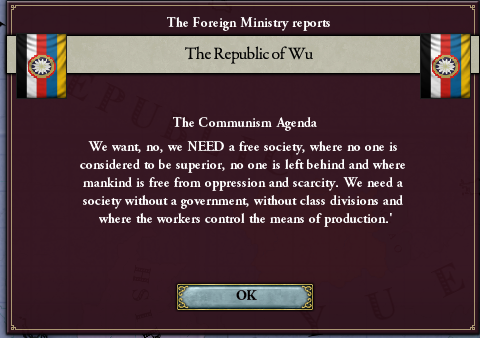 Wu also tended to have a lot of radicals; they tended to fascist because of their lack of cores in this version of the mod. If there is any interest, I could see if I could scrape together what's left of it and upload it. Kangxi fucked around with this message at 01:05 on Jan 11, 2023 |
|
|
|
Vic2 economic stuff is weird. I never saw the machine tools shortages myself, but there were regular enough reports of them. Which is weird, I'd think artisans would make enough to get things started.
|
|
|
|
A Visual History of Carantania - Part 3 Illuminated Silver Plates circa 1835 - Ermedumnou "Ermes" Azarian Taken during the excentric scholar and inventor voyages through Awiropa, these images show the the historical hinge between traditional occidental customs and the new influences coming from Asia and Mictlampa.
|
|
|
|
Hey these are outstanding. I'm going to add a link in the OP Also expect a state of the world post Soon
|
|
|
|
PRELUDE: DECEMBER 1835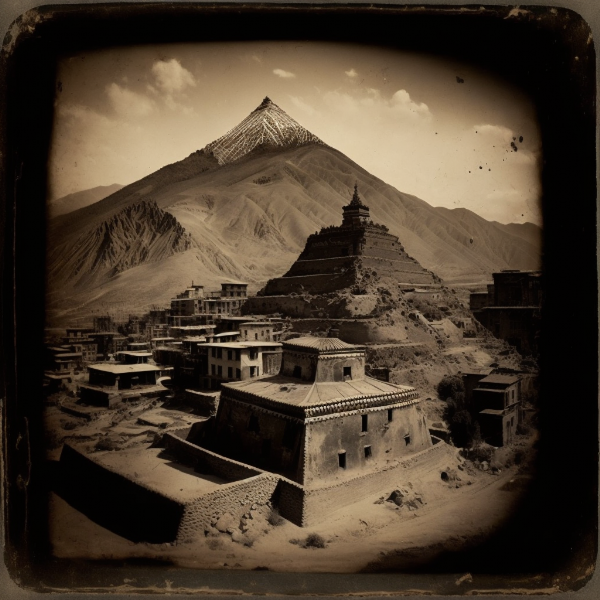 ['Silver plate' photograph, Lhasa, c. 1834. Note there are no pedestrians visible because the long exposure time prevents an image from forming.] The press, the machine, the railway, the telegraph are premises whose thousand-year conclusion no one has yet dared to draw. -Friedrich Nietzsche, Human, All Too Human The following is an extract from Shihon no jidai (資本の時代) by Hayashida Emiko. To follow the developments of society from the first industrial revolution and the first wave of political revolutions in depth is not the aim of this volume; that was the primary subject of my previous work, Kakumei no jidai (革命の時代). It is necessary to remind ourselves, however, of the 'twin revolutions' of the period between 1718 and 1830, and their domination by a 'twin revolution'. The first is the industrial revolution, which saw the introduction of new maufacturing processes and power sources: the use of steam power to replace the burning of biomass, machine tools replacing hand tools, the manufacture of chemicals and dyes, the use of coal furnaces to make iron. This revolution was global, and had its hotspots of activity - the lower Yangzi river, the Gangetic Basin, the island of Java, Thrace, the Ka’nón:no River, and the Chesepiooc Bay were only some of the centers which spontaneously saw the development and wider use of these tools and methods. The second revolution was societal. The dissolution of the Anatolian Empire in 1718 and the establishment of the Anatolian Republic was only the first of many revolts against established monarchies and hierarchical systems across the globe. Yet for all of the intensity of these revolts, and for all the renown of Tefere Assefe Abateid's revolutionary campaigns retain in the public eye, in which the overthrow and replacement of various monarchies was established, these campaigns grounded to a halt with his death in 1789, and a failed campaign along the Kongo River was abandoned by the late 1820s. Much depended on the local conditions of said monarchies, and the ability of local elites to retrench or redirect any political discontent. The late 1830s saw incipient forms of nationalism, that is, that after multinational empires dissolved, that peoples of the same culture and language, broadly defined, would share a common nation-state; liberalism, which contniued into agitate further rights and freedom of expression after monarchies were demolished, and conservatism, which not only opposed the revolutionary movements of nationalism and liberalism, but in some cases even the changes of the first industrial revolution, as a threat to elite power bases, the world of landowners and tenant farming and human rent and lease. These two revolutions in turn were one act of the drama of the coming decades. While the period from 1718 to 1830 is often eulogized as a time of high drama in popular history, that does not mean that the later decades were of less interest or that they are simply less eventful. In their own time, these decades were recognized a time of progress on a grand-scale, self-assured, relentless; the drums and flutes and choruses of the previous decades went on. And for the talented players on stage, their roles changed in the way the movement of light across a lacquered mask changes the meaning of its expression. And yet for the poor, this progress saw an upheaval in their ways of life, and for those who lived outside of the realm of industry and markets, their way of life was marked by a question of how to resist, or how to turn this 'progress' to benefit themselves. Historical events do not predicate themselves solely on the vanity of the master but of the others' desire satisfying their most fundamental needs. To sum up a few examples: 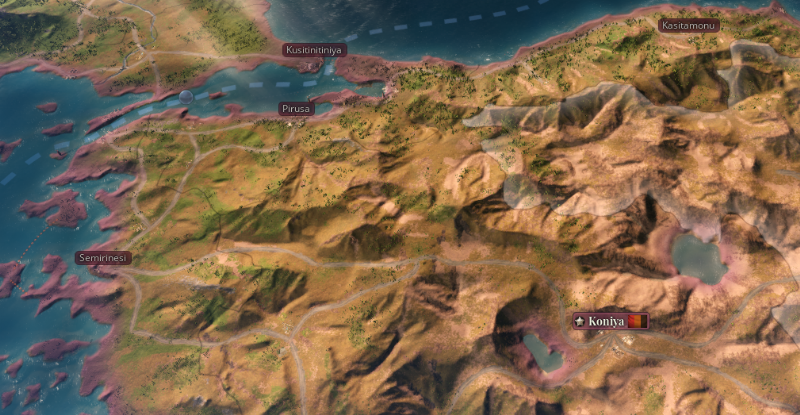 The Anatolian Republic, from its vantage point at the city of Koniya, still saw itself as the center of the progressive civilization, a beacon of enlightened republican civilization. Its citizens enjoyed the benefits of a tolerant system of laws, or relative freedom from the onerous burdens of kingship. 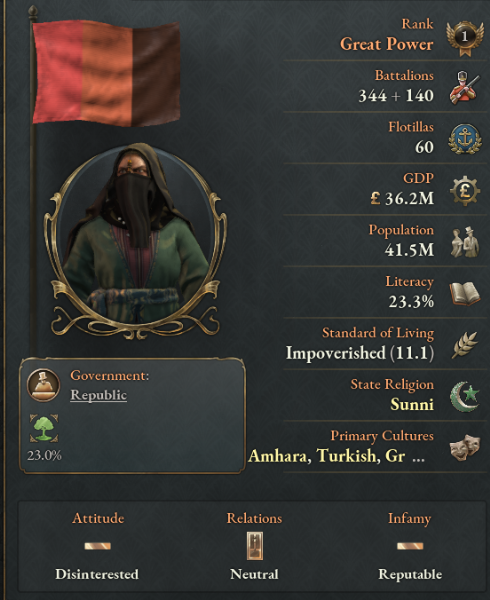 Any setbacks in foreign ventures notwithstanding, the vast territories of the republic were enough to support a large army, several centers of industrial development, and a large population. The newly elected head of state, Noura al-Ashari, came from the hinterlands of rural Anatolia, and promised a return to the principles of the revolution of a century before. The preceding Fannah administration had been unceremoniously discarded for its military adventurism and waste, and al-Ashari's promises of a new turn held considerable appeal. 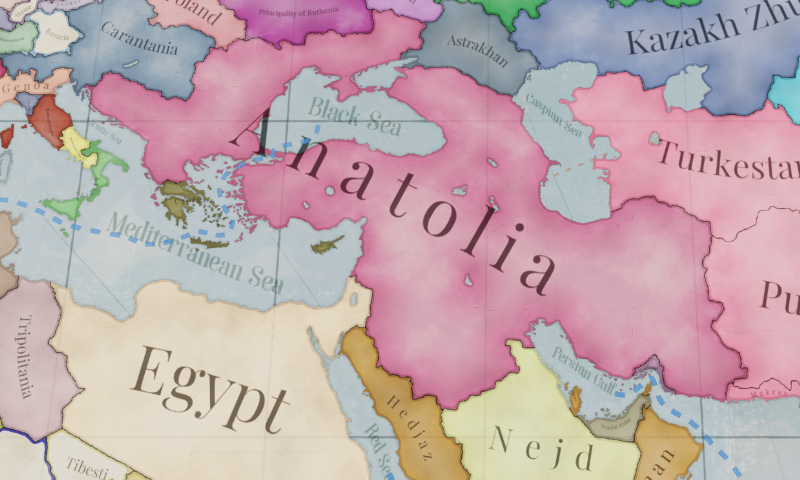 From its vantage point in West Asia, Anatolia enjoyed a favorable position across the central routes of trade, with unencumbered access to natural resources such as coal fields and iron mines, and was able to field a conscripted army sufficient to deal with any of its neighbors, or possibly all of them at once. This was not so far removed from the Anatolian Republic which had humiliated the Tibetan Repubilc and prevented the latter's further conquest of the North China Plain. 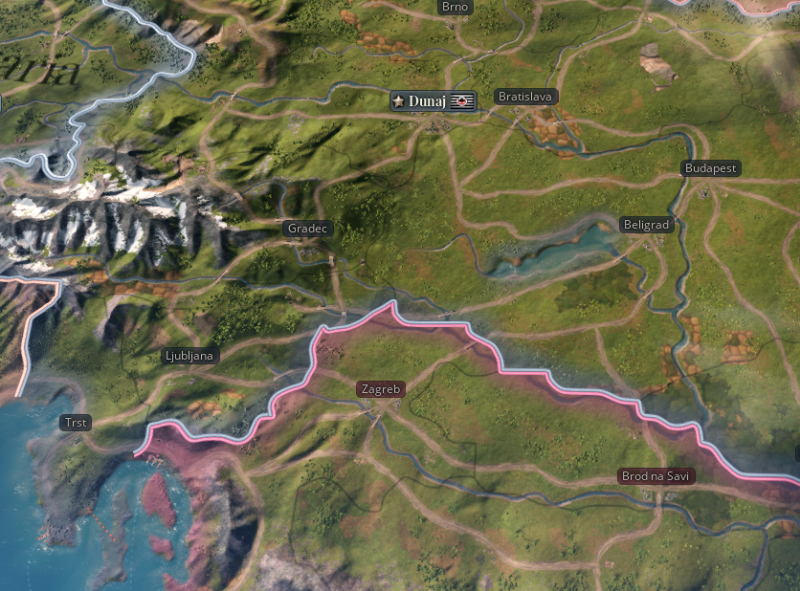 On Anatolia's northern frontier, its most persistent rival was the Bogomilist state of Carantania. Once an empire, then a republic, now once again an empire, Carantania found itself on an uneasy footing, having continually forced to retreat across its southern frontier over the past century. 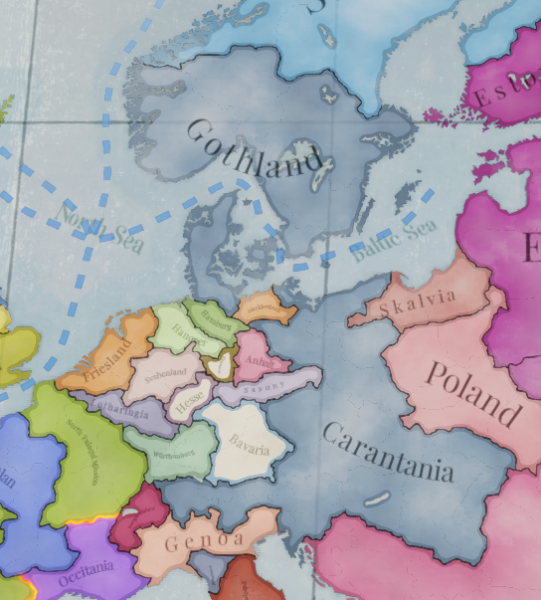 On paper, Carantania still enjoyed many strengths - a large and diversified through mostly agricultural economy, a large army, weak neighbors in most directions. However, the Kynaz Dorogov IV fretted about nationalist revolts and the return of liberal republicanism in his country; any reforms planned were not purely out of generosity and charity but out of fear of overthrow. As a foreign commentator once wrote of the empire; 'the most dangerous time for a bad government is when it chooses to reform'. Nationalist revolts were not only an abstract fear of the ruling elite at this time. 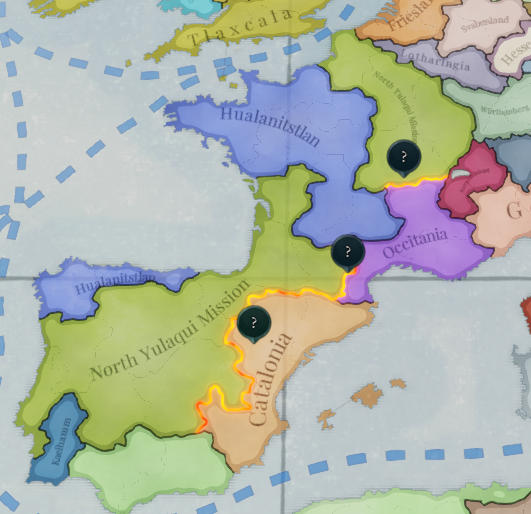 To the near west, the North Ulaqui Mission, established by the great Tsalagi theocracy to consolidate the administration of the territories of Awiropa, faced two simultaneous revolts. 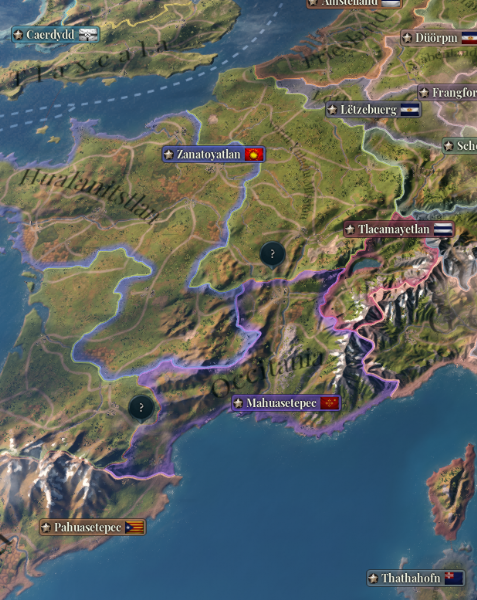 The first of these was the Occitan Revolt, started by students at the University of Mahuastepec. During the previous centuries, the peoples of this region revolted several times against their colonial masters, though often without success until the successful revolt of Hualanitstlan further north. A secret society in the south planned to emulate this successful rebellion, and led by disgrunted officer cadets, they stormed the armory. When troops were brought in to suppress the rebellion, many turned and joined their fellows in arms. The revolt further south was sparked by the decision to use other troops to suppress the rebellion, and that instead sparked a second religious revolt based near the city of Pahuastepec.  The Tsalagi metropole, on the other hand, retained considerable stability and wealth; the theocratic regime there had proven itself well disposed to the maintence of domestic stability and securing a place first as a regional and then as an intercontinental power in the last years of the 18th century.  Having maintained an advantageous position near central Mictlampa, the Tslagi would be disposed to maintain control and develop their overseas territories at their leisure...  were it not for the continental hegemon, the Nakota Empire. 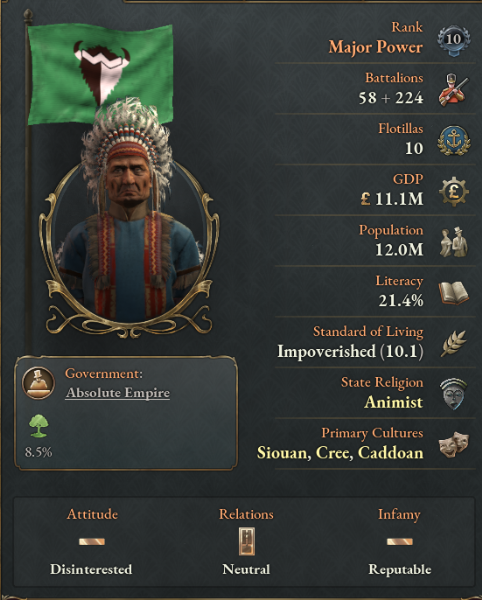 Through the singular determination of its government and years of relentless campaigning, had brought low nearly all of its competitors and expanded across the entire North Mictlampa plain. 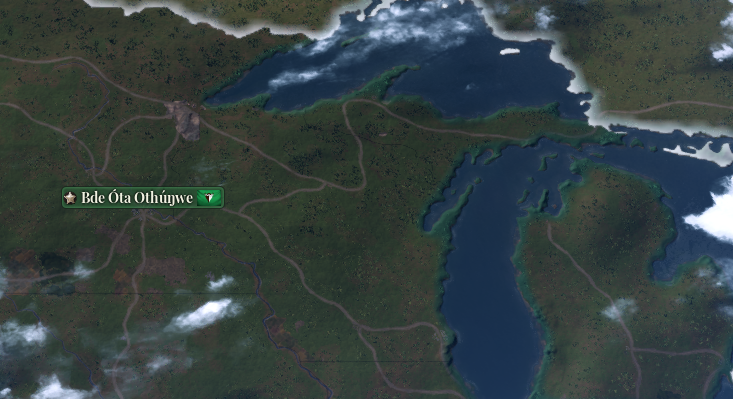 Recent histories tended to turn in detail to the administration of such a vast territory, first through access to hunting grounds, migratory trading posts, tributary routes, with the control of intersecting networks of power than a rigid administration; the early Nakota Empire may at least be superficially compared to the first stages of the Mongolian or early Tibetan empires given their heavy reliance on equestrian discipline; however, the continued survival of the empire saw further urbanization and the development of cities alongside the Misi zipi River, the Mictlampan Great Lakes, and so on. 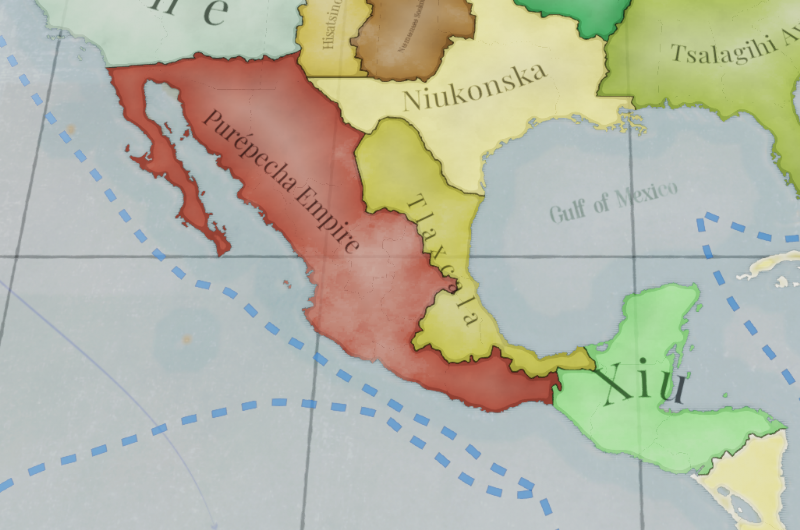 This is turn may be distinguished from the more 'traditional' urbanized polities of the Purepecha and of the city of Tlaxcala; both arise from the collapse of the Ēxcān Tlahtōlōyān; both held largely urbanized areas for much of their history; both held substantial overseas territories. After several revolts, the Purepecha retained more urbanized territories in the Itarha peninsula and the Tlaxcala retained southern Irland and Anglaland. 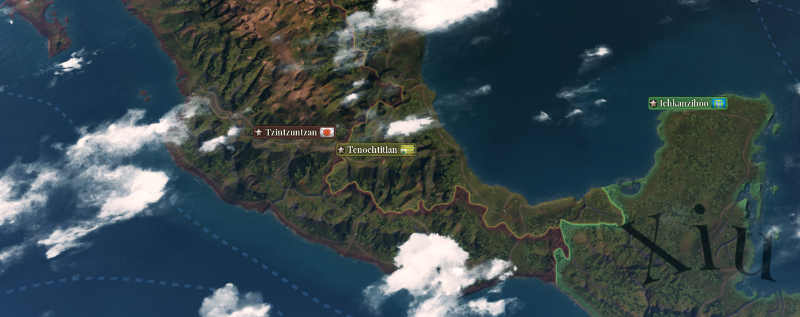 The Xiu, by contrast, was a more decentralized polity, where elected power was split between several city-states; they too maintained foreign colonies for their benefit.  Further south is the Muisca Confederation, a loose confederation of local rulers. The system was renowned for centuries for its prolonged stability and novel electoral system, where out of a pool of selected candidates a head of state was chosen by lot. Notably, this system was very nearly adopted by the 18th century Tibetan Republic but narrowly lost out in committees. While the Muisca electoral system has since been reformed to a system of direct election for heads of state, sortition is still widely used for citizens assemblies, selection of local candidates, and even administration of minor punishments. 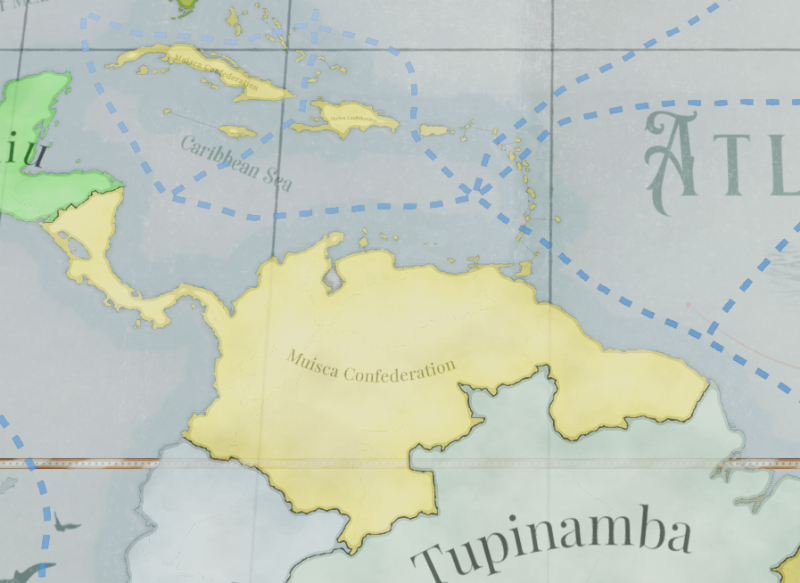 Given the larger population near the capital and along the Caribbean Islands, these areas have tended to benefit from prolonged government patronage, while the more sparsely populated areas to the east have been neglected; 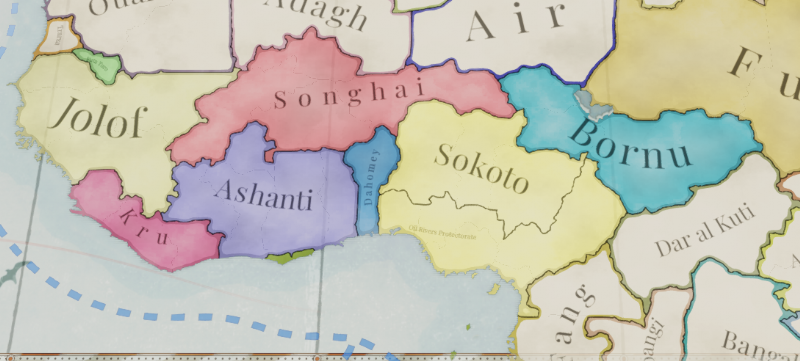 to say nothing of the Muisca colonial holdings, which had at first claimed large swathes of territory and had no way to govern them, then have been forced to cede considerable autonomy to local leaders, and are in the possibility of near-immediate revolt. While this part of the continent, between the Gambia and the Niger Delta and the former domains of the Mali Empire, has not been united under a single hegemon for centuries, there are several suitable candidates each hoping to claim the mantle of prosperity and continental reach, and ultimately to use modern technology to do defeat any extractive incursion. 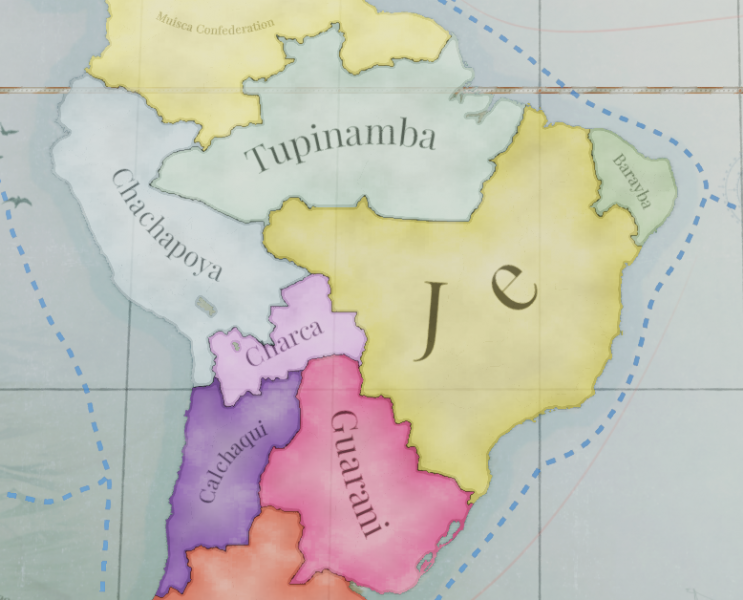 Further south of the Muisca Confederation, several states were in contention for regional hegemony; the Chachapoya controlled much of the urban centers of the former Tawantinsuyu, and in the east, the Je Confederation held much of the coastal areas as well as the rich agrictural and forested interior of the continent. 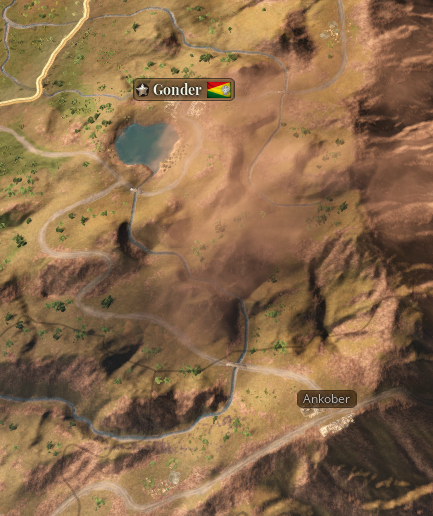 Moving further east, we turn to the Ethiopian Empire; this was the other pre-eminent case of a successful counterrevolution against liberal revolts.  The re-establishment of a monarchy but with some limited constitutional protections and voting assemblies was created as a means of instituting a pressure valve on what ultimately remained an autocratic regime and hierarchical caste-based society. Additionaly, the dismal state of the peasantry had stunted economic growth for the past decade. 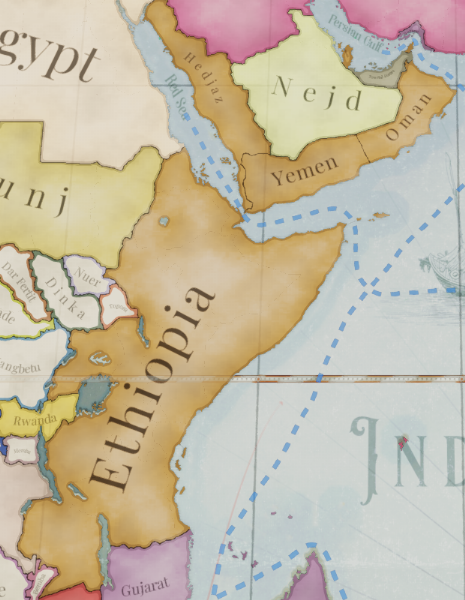 That is not to say that Ethiopia was not a major power on the rim of the Indian Ocean - it still retained that role - but the reformers among the aristocracy and those intellectuals who had remained in the country had despaired of the country's relative lack of urbanization as well as its lack of an established industrial base, fearing it may fall further and further behind in the coming decades. Mining of lead, coal, other vital materials was still performed with hand tools, 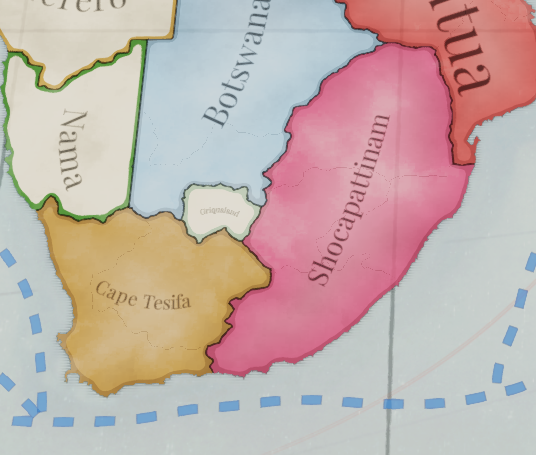 and this did not improve even in the remoter colonies. By contast, the great kingdom which bore the name Tamilakam, which also held territories in this region, near the lands of the Xhosa, administered them with greater competence and stability.  That would be a trademark of Tamil foreign and domestic policy over the past five decades under Queen Dolma - moderation, enlightenment, the paragon of the philosopher monarch. 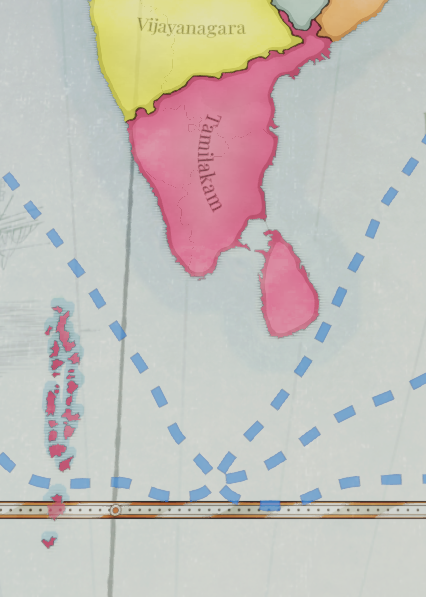 The Tamil kingdom was one of the most prosperous of those that emerged after the dissolution of the Tibetan Empire; it emerged as an independent actor in the informal network of alliances that formed the Sacred Tibetan Empire, and had peacefully absorbed some smaller city states such as Kochin into its own administration. 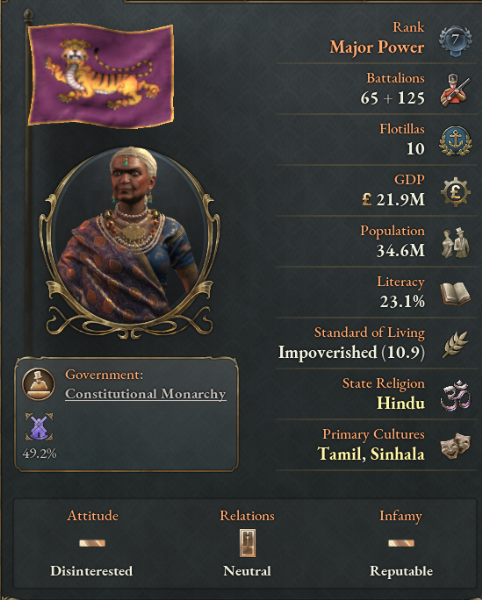 The monarchy had kept placated the large landholders as well as smaller mercantile families and so avoided prolonged domestic turmoil, but by 1830s, questions were asked, very quietly among intellectuals and student radicals about Queen Dolma's successor and if the delicate balancing act of ruling such a large and prosperous kingdom could be maintained by such a capricious institution as a royal family. 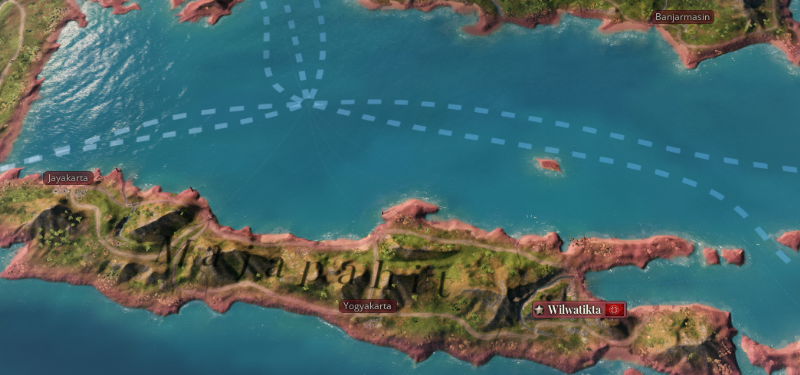 Further east was the thalassocratic regime of Majapahit. 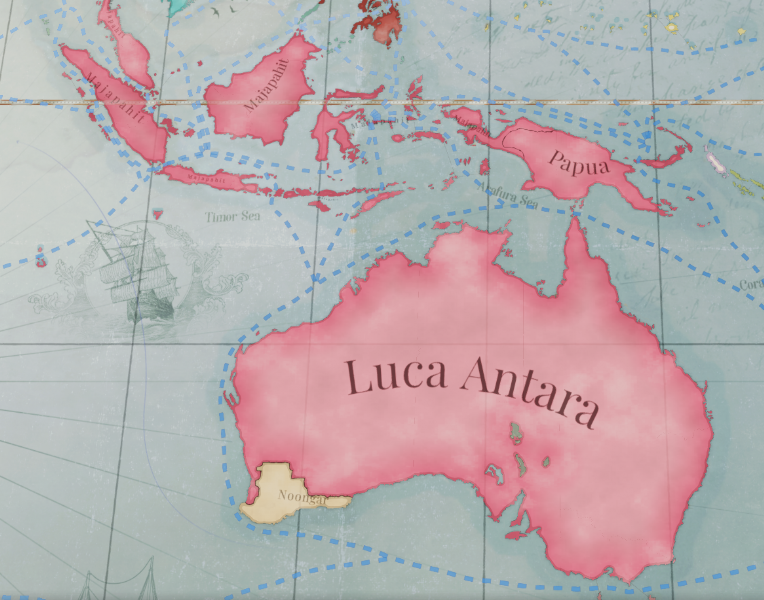 Still possessing the largest navy in the world, the empire expanded its influence far beyond the island of Java onto thousands of other islands and achieving success in both military campaigns and exploration - notably the discovery of an icy mass in the furthest south of the world.  These lands were ruled with an iron fist, and the possession of many rare commodities would only serve to strength the ruling Suryavansha house, which allowed some autonomy in foreign trade in exchange for absolute loyalty to the monarchy. 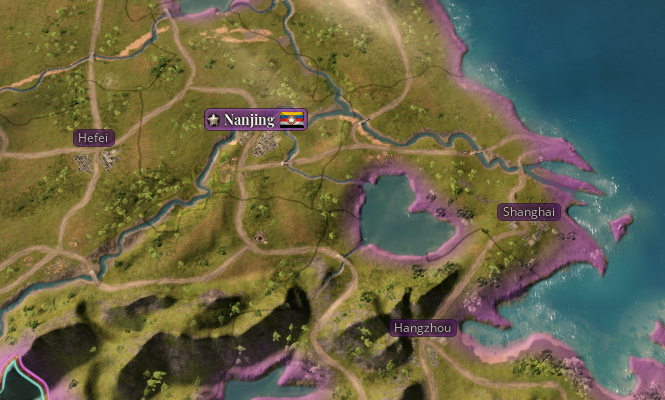 This was in marked contrast to the Republic of Wu to the north, then the world's most populous republic.  While not a democracy with a universal franchise as one might expect, Wu had become a major power across the region, 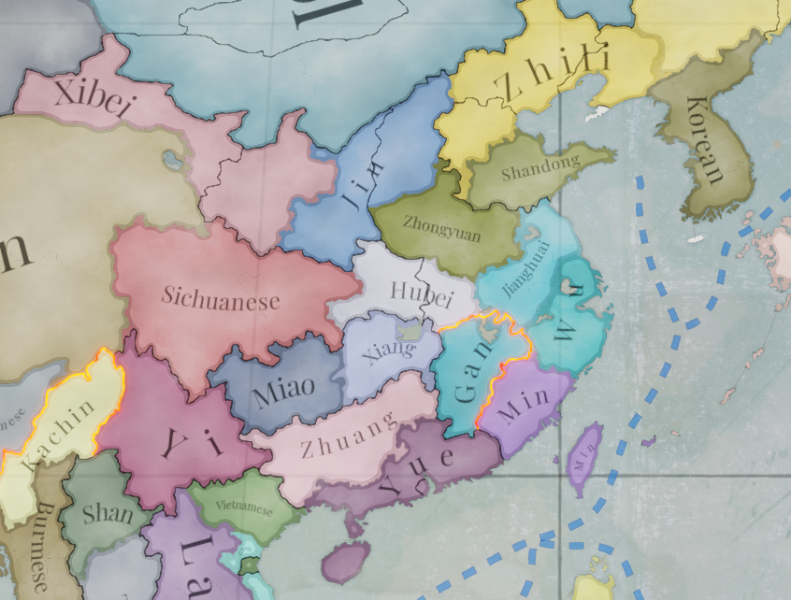 and its sheer scale and influence had lent it to dreams of pan-Chinese nationalism, of unifying all of the separate languages and groups into a single state.  These dreams had manifested in untoward directions - Qi Shanlan, the newest elected head of state, had been more of an outright chauvinist towards Wu's neighbors. In the most recent election, she had all but goaded the republic into a war against the smaller Kingdom of Ning, in the former Jiangxi Province. The Gan Expedition (赣伐), as it was soon called, was promised to end banditry and lawlessness on the southern frontier, and to be a quick and decisive war to expand Wu's reach, contain Tibetan influence, and end the disorder that had plagued the region since the fall of the Tibetan-imposed Jin Dynasty in the 1400s. 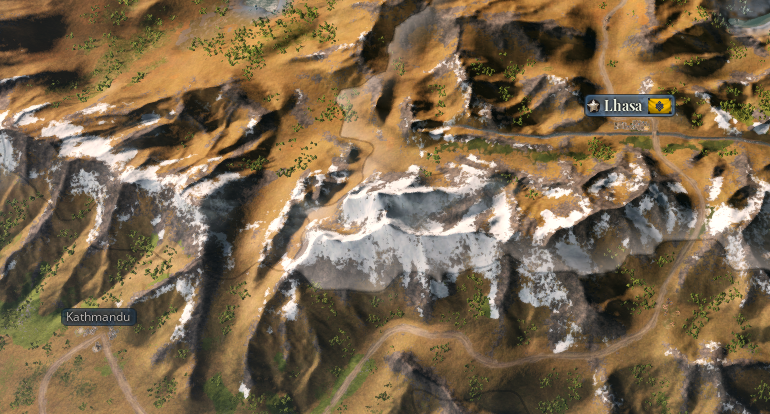 Speaking of Tibet, the empire that had once commanded territory from Baghdad to Lanka, and from the Tarim Basin to Chongqing was now replacd in the form of a representative republic. In the way that athletes despair to find themselves winning second-best, the Tibetan Republic was now attempting to navigate a place in the world where it was a power but not a universal power. 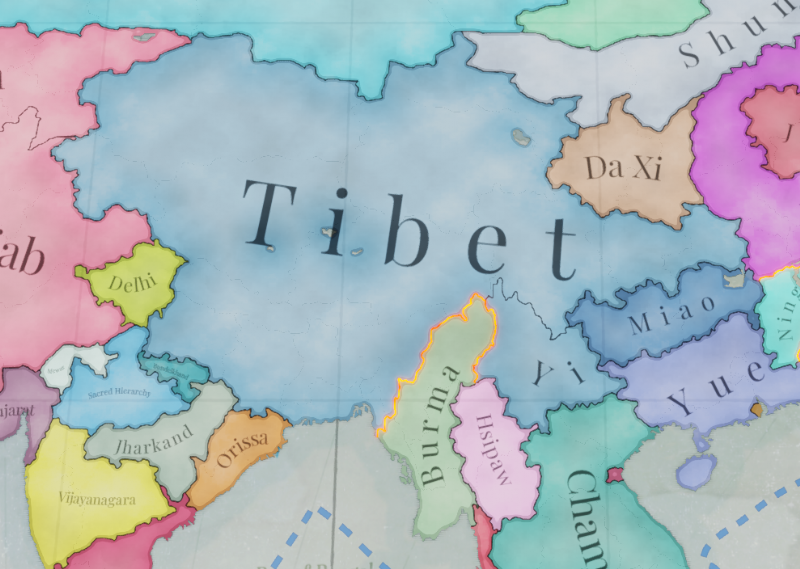 The Tibetan plateau itself contained only a miniscule fraction of the Republic's population. Statistics from the early bureau of the treasury show that less than 10% of the republic's revenue from taxation came from the Tibetan Plateau, and the majority either came from the southern territories near the Ganges, or from the Sichuan Basin. 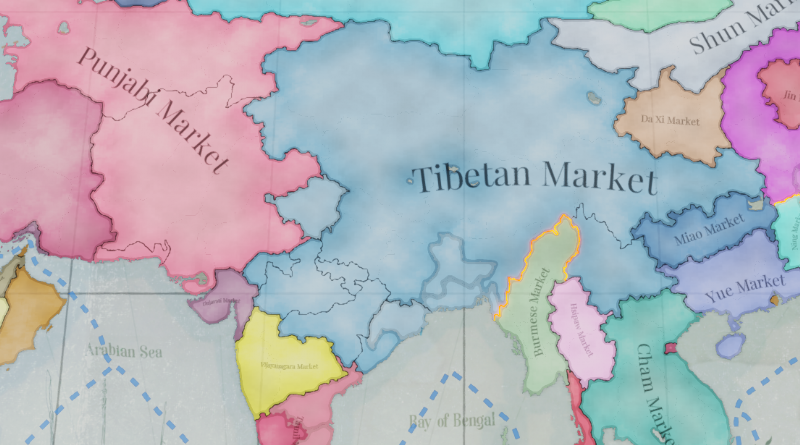 The Tibetan Repubic had negotiated a favorable trading regime and eventually an outright customs union with many of its smaller neighbors, although Punjab, Vijayanagara, and Tamilakam abstained, being more protective of their local industries, and suspicious of Tibetan aims. 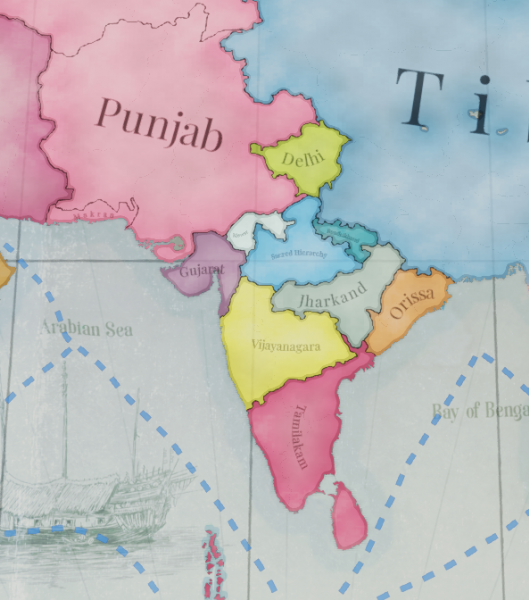 The long shadow of Tibetan rule over the entire subcontinent, first directly and then as part of the Sacred Tibetan Empire, remained in the arbitrary nature of its borders, of a shared body of laws, and an aristocracy which continued to use Tibetan names. Smaller city-states and polities had retained a nominal independence during the period of the Sacred Tibetan Empire, and these quickly lost their independence in the years following its dissolution. Some city-states signed favorabe treaties with their neighbors, a monastic order based in Chanda swore direct fealty to the Sacred Hierarchy, and city states with some form of representative rule merely dispensed with the last vestiges of fealty to some Emperor they would never see. 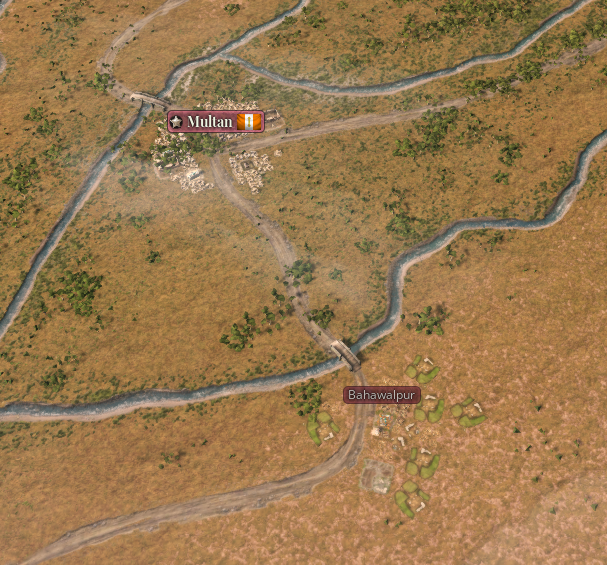 Other regional centers, such as Tamilakam or Punjab, would be independent to pursue their own policies.  Tsultrim Dbas, elected in 1830 as a caretaker president, would at first appear representative of the heads of state found in Tibetan politics of this era. Appealing to an urban intellectual elite, but then coasting to an easy majority on the basis of a large rural population and easy vote-buying. Her tenure would have been otherwise completely unremarkable had she then found herself with the prospect of facing the largest revolt against the Tibetan republic since the 1800s. In October 1835, Maung Soe, a Bamar tobacco seller and food cart owner, was harassed by a municipal official and his cart and merchandise were confiscated. Despondent, he committed suicide by immolation in front of the Provincial Administrative Office in Mandelei. The spectators were at first stunned into silence, with some crying and some praying openly. The municipal police, first assigned to restrain the crowds, had some members prostrate in reverence. Within days, crowds formed in protest in Mandalay, and word soon spread across much of the region. The unusually poor harvest in that part of the republic that year had already worsened conditions for many, and soon crowds were pushing back the police and breaking into armories to locate more weaponry. Within two months, nearly the entire region was in revolt, and proclamations were made demanding independence, in what would become the most recent of many revolts made against Tibetan administration since the 1400s, but this one had covered the largest area and was the best organized.  What has been listed here was an attempt to provide the briefest context of events of the first half of the 19th century. Speaking personally, as a historian one must be aware of the impermanence of things, of the knowledge that every state or empire will perish some day. Political actors, in their time and situation, must seek to solve problems, whatever those problems are. Political elites also are inheritors of past conquests, and so when they view history they place themselves alongside the victor. While it is tempting as a historian to claim that there are recurring patterns, that there are cycles which can be located and predicted, the complexity events prevents the easy categorization of events, of even the most brilliant. Yet with the rapid changes in human society, which had never been before seen with the advent of industrialization and the rapid dissolution of monarchy, it would be tempting to suggest that the wheel did not turn, that the pattern of rise and fall may be halted for a moment, that the burdens of the past and the animated ghosts of history may be put at ease. There are areas where the spy cannot discern, nor the wise make plans against. What we call history yet arises from this storm. A Tibetan student in Dakka wrote to his brother: "We are sleeping on a volcano. Now the earth trembles." A TABLE OF RANKS OF THE GREAT POWERS, 1836 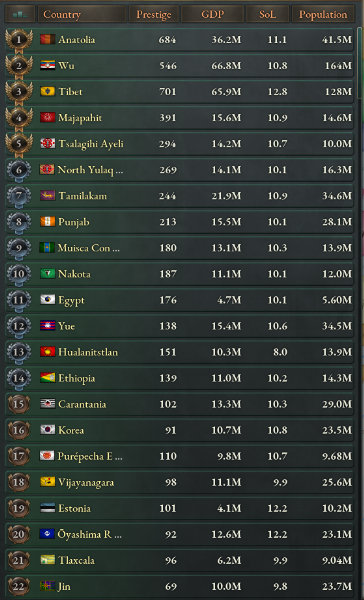 THE WORLD: JANUARY 1836  Nota bene: Given the news that 1.2 is in the works, I am planning to delay the first few updates until after the release of the 1.2 patch at least. I am producing some workable playthroughs with a collection of mods but these will change after a big patch. Additionally, many things you see here are subject to change after the patch is out. Likewise, I intend to do some additional mod work between now and the actual start of the LP. But I have enough to present something here. Thank you all for your patience.
|
|
|
|
Is that a Hobsbawm reference I see?  Anyways, that's a really interesting text! Luca_024 fucked around with this message at 04:00 on Jan 22, 2023 |
|
|
|
Got it correct in the first post.
|
|
|
|
Fancy and also good. Was modding in the gender equality particularly complicated?
|
|
|
|
 Extremely excited to see this back.
|
|
|
|
Hellioning posted:Fancy and also good. Was modding in the gender equality particularly complicated? That was one of the easiest things to do, actually. There is a folder with text files defining the various interest groups (game/common/interest_groups) and a couple lines in each file that defines the percentage of women being politicians or military commanders. All I had to do was change the value from 0 to 0.5 for everything. Empress Theonora posted:
Thank you!!!!!
|
|
|
|
Kangxi posted:That was one of the easiest things to do, actually. There is a folder with text files defining the various interest groups (game/common/interest_groups) and a couple lines in each file that defines the percentage of women being politicians or military commanders. All I had to do was change the value from 0 to 0.5 for everything. Sweet, cool to know.
|
|
|
|

|
| # ? Apr 16, 2024 20:08 |
|
I am very excited for this to be back. We must complete the work of ages and bring forth the birth of Pan-Asian Sacred Universalism.
|
|
|


















